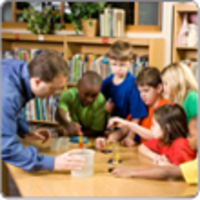-
Where is the Land of Opportunity? The Geography of Intergenerational Mobility in the United States
Chetty, R., Hendren, N., Kline, P., & Saez, E. (2014). Where is the Land of Opportunity? The Geography of Intergenerational Mobility in the United States (Working Paper No. 19843). National Bureau of Economic Research. https://doi.org/10.3386/w19843
-
When They Go Low, We Go High: Scholars of Color, Activism, and Educational Research in a Post-Truth Era
Childs, J., & Johnson, S. (2018). When They Go Low, We Go High: Scholars of Color, Activism, and Educational Research in a Post-truth Era. Education Policy Analysis Archives, 26, 146–146. https://doi.org/10.14507/epaa.26.3342
-
Traditions of Quality Improvement in Education
Bush-Mecenas, S., & Anderson, E. (2020). Scale and Sustainability of Education Innovation and Improvement. In Oxford Bibliographies. Oxford University Press. https://doi.org/10.1093/obo/9780199756810-0240
-
The Policy Context of United States Educational Innovation and Improvement
Peurach, D. J., & Foster, A. T. (2020). The Policy Context of United States Educational Innovation and Improvement. Oxford Bibliographies. https://doi.org/10.1093/OBO/9780199756810-0249
-
The Dilemmas of Educational Reform
Cohen, D. K., Spillane, J. P., & Peurach, D. J. (2018). The Dilemmas of Educational Reform. Educational Researcher, 47(3), 204–212. https://doi.org/10.3102/0013189X17743488
-
Technical Curriculum Form and American Elementary School Art Education
Bullough, R. V., & Goldstein, S. L. (1984). Technical Curriculum Form and American Elementary School Art Education. Journal of Curriculum Studies, 16(2), 143–154. https://doi.org/10.1080/0022027840160204
-
Teacher Collaboration in School Improvement
Weddle, H., Lockton, M., & Datnow, A. (2020). Teacher Collaboration in School Improvement. In H. Weddle, M. Lockton, & A. Datnow, Oxford Bibliographies: Education. Oxford University Press. https://doi.org/10.1093/obo/9780199756810-0248
-
 Supporting Continuous Improvement in California's Education System
Supporting Continuous Improvement in California's Education System Darling-Hammond, L., & Plank, D. N. (2015). Supporting Continuous Improvement in California’s Education System. Policy Analysis for California Education. https://edpolicyinca.org/publications/supporting-continuous-improvement-californias-education-system
-
Scale and Sustainability of Education Innovation and Improvement
Bush-Mecenas, S., & Anderson, E. (2020). Scale and Sustainability of Education Innovation and Improvement. In Oxford Bibliographies. Oxford University Press. https://doi.org/10.1093/obo/9780199756810-0240
-
Research–Practice Partnerships in Education Within The United States
Arce-Trigatti, P., & Farrell, C. C. (2021). Research–Practice Partnerships in Education Within The United States. In Oxford Bibliographies. Oxford University Press. https://doi.org/10.1093/obo/9780199756810-0274
-
Politics, Markets, and America’s Schools
John E. Chubb, & Moe, T. M. (1990). Politics, Markets, and America’s Schools. Brookings Institution Press. https://www.brookings.edu/book/politics-markets-and-americas-schools/
-
Organizing for Continuous Improvement in Education
Cohen-Vogel, L., Harrison, C., & Rauch Griffard, M. (2019). Organizing for Continuous Improvement in Education. In Oxford Bibliographies. Oxford University Press. https://doi.org/10.1093/obo/9780199756810-0229
-
Organizational Theory for Equity and Diversity: Leading Integrated, Socially Just Education
Capper, C. A. (2018). Organizational Theory for Equity and Diversity: Leading Integrated, Socially Just Education. Routledge. https://doi.org/10.4324/9781315818610
-
Measurement for Improvement in Education
Takahashi, S., Norman, J., Jackson, K., Ing, M., & Chinen, S. (2020). Measurement for Improvement in Education. In Oxford Bibliographies. Oxford University Press. https://doi.org/10.1093/obo/9780199756810-0247
-
Improvement Science Meets Improvement Scholarship: Reframing Research for Better Healthcare
Cribb, A. (2018). Improvement Science Meets Improvement Scholarship: Reframing Research for Better Healthcare. Health Care Analysis, 26(2), 109–123. https://doi.org/10.1007/s10728-017-0354-6
-
Framing the Problem of Reading Instruction: Using Frame Analysis to Uncover the Microprocesses of Policy Implementation
Coburn, C. E. (2006). Framing the Problem of Reading Instruction: Using Frame Analysis to Uncover the Microprocesses of Policy Implementation. American Educational Research Journal, 43(3), 343–349. https://doi.org/10.3102/00028312043003343
-
Equity and Improvement: Engaging Communities in Educational Research
Asaah, D., Thakurta, A., Ghiso, M. P., & Campano, G. (2020). Equity and Improvement: Engaging Communities in Educational Research. Oxford Bibliographies. Oxford University Press. https://doi.org/10.1093/obo/9780199756810-0253
-
Design Thinking and the Learning Sciences: Theoretical, Practical, and Empirical Perspectives
Saxena, P., Sedas, R. M., & Peppler, K. (2021). Design Thinking and the Learning Sciences: Theoretical, Practical, and Empirical Perspectives. In Oxford Bibliographies. Oxford University Press. https://doi.org/10.1093/obo/9780199756810-0267
-
Cross-Sector Research on Continuous Learning and Improvement
Peterson, A., Yurkofsky, M., & Mehta, J. (2020). Cross-Sector Research on Continuous Learning and Improvement. In Oxford Bibliographies. Oxford University Press. https://doi.org/10.1093/obo/9780199756810-0239
-
Cross-National Research on Continuous Improvement
Koranyi, F., & Kolleck, N. (2020). Cross-National Research on Continuous Improvement. In Oxford Bibliographies. Oxford University Press. https://www.oxfordbibliographies.com/view/document/obo-9780199756810/obo-9780199756810-0237.xml
-
Conceptualizing, Measuring, and Evaluating Improvement Networks
Sherer, D. G., Paquin-Morel, R., Larbi-Cherif, A., & Russell, J. L. (2021). Conceptualizing, Measuring, and Evaluating Improvement Networks. In Oxford Bibliographies. Oxford University Press. https://www.oxfordbibliographies.com/view/document/obo-9780199756810/obo-9780199756810-0271.xml
-
Coherent Instructional Systems at the School and School System Levels in the United States
Sharpe, C. J., & Cobb, P. (2020). Coherent Instructional Systems at the School and School System Levels in the United States. In Oxford Bibliographies. Oxford University Press. https://www.oxfordbibliographies.com/view/document/obo-9780199756810/obo-9780199756810-0262.xml
-
Advocacy and Activism in Early Childhood
Mevawalla, Z., & Archer, N. (2022). Advocacy and Activism in Early Childhood. In Oxford Bibliographies. Oxford University Press. https://www.oxfordbibliographies.com/view/document/obo-9780199756810/obo-9780199756810-0291.xml?q=Advocacy+and+Activism+in+Early+Childhood
-
A Neoliberal Grammar of Schooling? How a Progressive Charter School Moved toward Market Values
Castillo, E. (2020). A Neoliberal Grammar of Schooling? How a Progressive Charter School Moved toward Market Values. American Journal of Education, 126(4), 519–547. https://doi.org/10.1086/709513
-
A Model of Continuous Improvement in High Schools: A Process for Research, Innovation Design, Implementation, and Scale
Cohen-Vogel, L., Cannata, M., Rutledge, S. A., & Socol, A. R. (2016). A Model of Continuous Improvement in High Schools: A Process for Research, Innovation Design, Implementation, and Scale. Teachers College Record, 118(13), 1–26. https://doi.org/10.1177/016146811611801301
 Supporting Continuous Improvement in California's Education System Darling-Hammond, L., & Plank, D. N. (2015). Supporting Continuous Improvement in California’s Education System. Policy Analysis for California Education. https://edpolicyinca.org/publications/supporting-continuous-improvement-californias-education-system
Supporting Continuous Improvement in California's Education System Darling-Hammond, L., & Plank, D. N. (2015). Supporting Continuous Improvement in California’s Education System. Policy Analysis for California Education. https://edpolicyinca.org/publications/supporting-continuous-improvement-californias-education-system

